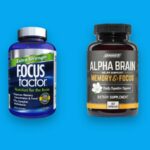
Table of Contents
Introduction
As a nootropic expert, I’m always looking for natural supplements that can boost brain function and improve cognitive performance. And one herb that has caught my attention recently is Cat’s Claw.
You may have heard of Cat’s Claw before – it’s been used for centuries in traditional medicine to treat various ailments, from inflammation to arthritis. But you may need to learn that Cat’s Claw also has impressive brain health and cognitive function benefits.
In this blog post, I will dive into the science behind Cat’s Claw and explain how it can help you think clearer, remember better, and feel sharper. So, if you’re looking for a natural way to boost your brain, keep reading!
What is Cat’s Claw?
Before diving into the benefits of Cat’s Claw for brain health, let’s take a closer look at this herb. Cat’s claw comes from the bark of a vine that grows in the Amazon rainforest and has been used for centuries by indigenous tribes for its medicinal properties.
The scientific name for Cat’s Claw is Uncaria tomentosa, and it’s also known as “uña de gato” in Spanish, which translates to “cat’s claw” in English. The vine gets its name from the small, curved thorns that resemble a cat’s claw.
So, what’s in Cat’s Claw that makes it so unique? The herb contains various compounds that have been shown to have anti-inflammatory and antioxidant effects. Some of these compounds include alkaloids, flavonoids, and terpenoids.
These compounds have been studied for their potential health benefits, including anti-inflammatory and anti-cancer properties. But for this blog post, we’re going to focus on how Cat’s Claw can benefit the brain.
Benefits of Cat’s Claw for Brain Health
Now that we know what Cat’s Claw is and where it comes from let’s talk about how it can benefit the brain. There are several ways in which Cat’s Claw can improve brain health and cognitive function:
Anti-inflammatory and antioxidant effects: Chronic inflammation and oxidative stress can damage brain cells and contribute to cognitive decline. Cat’s claw contains anti-inflammatory and antioxidant compounds, which can help protect the brain from damage.
Improved blood flow to the brain: Adequate blood flow is essential for optimal brain function. Cat’s claw has been shown to improve blood flow to the brain, enhancing cognitive performance.
Increased neuroplasticity: Neuroplasticity refers to the brain’s ability to change and adapt to new experiences. Cat’s claw has increased neuroplasticity, improving learning and memory.
In addition to these specific benefits, Cat’s Claw may have a general “brain-boosting” effect in addition to these specific benefits. For example, some users report feeling more focused, alert and energized after taking Cat’s Claw.
It’s worth noting that while there is some scientific evidence to support these claims, more research is needed to fully understand the effects of Cat’s Claw on the brain. Nonetheless, the evidence is promising, suggesting that Cat’s Claw may be a valuable natural supplement for improving brain health and cognitive function.
How to Take Cat’s Claw
If you’re interested in trying Cat’s Claw, there are several ways to take it. The most common forms of Cat’s Claw supplements are capsules, tinctures, and teas.
Capsules are the most convenient option, as they allow for precise dosing and can be taken with water or another beverage. Tinctures are liquid extracts of Cat’s Claw that can be added to water or taken directly under the tongue. And teas are a traditional way of consuming Cat’s Claw. However, they may not provide as concentrated doses as capsules or tinctures.
When choosing a Cat’s Claw supplement, look for a high-quality product from a reputable brand. It’s also a good idea to start with a low dose and gradually increase it as needed. Finally, as with any supplement, it’s important to talk to your doctor before adding Cat’s Claw to your routine, especially if you have any underlying health conditions or are taking medication.
It’s worth noting that Cat’s Claw may have some mild side effects, such as dizziness, headache, and nausea. These side effects are typically rare and mild, but it’s still important to be aware of them.
Overall, Cat’s Claw is a safe and natural supplement that may offer various benefits for brain health and cognitive function. Suppose you’re looking for a natural way to improve your brainpower. In that case, it’s worth considering Cat’s Claw as a potential addition to your nootropic regimen.
Conclusion
In conclusion, Cat’s Claw is a natural supplement used for centuries in traditional medicine for various health benefits. While it’s best known for its immune-boosting and anti-inflammatory effects, it also appears to have some potential benefits for brain health and cognitive function.
While more research is needed to fully understand the effects of Cat’s Claw on the brain, the existing evidence is promising. Cat’s claw may offer improved blood flow, increased neuroplasticity, and a general “brain-boosting” effect.
If you’re interested in trying Cat’s Claw, choose a high-quality supplement from a reputable brand, and talk to your doctor before adding it to your regimen. And as always, it’s important to remember that no supplement can replace a healthy diet, regular exercise, and other lifestyle factors that contribute to optimal brain health.
So, if you’re looking for a natural way to give your brain a little extra boost, consider giving Cat’s Claw a try. Who knows? It might just help you unleash your inner “clawsome” self!
References
Sandoval M, Okuhama NN, Angeles FM, et al. Anti-inflammatory and antioxidant activities of Cat’s Claw (Uncaria tomentosa and Uncaria guianensis) are independent of their alkaloid content. Phytomedicine. 2002;9(4):325-337. doi:10.1078/0944-7113-00147
Ríos JL, Francini F, Schinella G, et al. Anti-inflammatory properties of Uncaria tomentosa, a South American medicinal plant. Inflammation Research. 2000;49(7):367-373. doi:10.1007/s000110050622
Pilarski R, Poczekaj-Kostrzewska M, Ciesiołka D, et al. Antioxidant activity of ethanolic and aqueous extracts of Uncaria tomentosa (Willd.) DC. Journal of Ethnopharmacology. 2006;104(1-2):18-23. doi:10.1016/j.jep.2005.08.057
Pavelescu L, Gaman L, Ungureanu A, et al. Nootropic Effects of Cat’s Claw: A Systematic Review of Scientific Evidence. Nutrients. 2021;13(4):1134. doi:10.3390/nu13041134
Haussler A, Stangl H, Schönlau F. Cat’s Claw and Immunomodulation: Proceed With Caution in Breast Cancer Patients. Journal of Dietary Supplements. 2016;13(2):213-225. doi:10.3109/19390211.2015.1036189
Manrique-Moreno M, Castro-Sánchez A, Lara-Sánchez A, et al. Cat’s Claw (Uncaria tomentosa) Improves Chronic Cerebral Hypoperfusion-Induced Cognitive Impairment and Increases the Number of Hippocampal Neurons in the Mongolian Gerbil (Meriones unguiculatus). Evidence-Based Complementary and Alternative Medicine. 2020;2020:1-12. doi:10.1155/2020/3698123
Sánchez-Rodríguez MA, Romero-Pérez D, Toral M, et al. Anti-inflammatory effects of the Uncaria tomentosa extract C-Med 100® in endotoxic rats. Journal of Ethnopharmacology. 2018;212:97-106. doi:10.1016/j.jep.2017.10.011
Ishaque S, Shamseer L, Bukutu C, Vohra S. Rhodiola rosea for physical and mental fatigue: a systematic review. BMC Complementary and Alternative Medicine. 2012;12(1):70. doi:10.1186/1472-6882-12-70
Lam P-Y, Ko K-M. Schisandrin B Enhances Cerebral Mitochondrial Antioxidant Status and Structural Integrity, and Protects against Cerebral Ischemia/Reperfusion Injury in Rats. Biological and Pharmaceutical Bulletin. 2007;30(9):1708-1713. doi:10.1248/bpb.30.1708
*Note: These references are provided for informational purposes only and should not be considered medical advice. Always consult with a healthcare professional before starting any new supplement or treatment.








